Ford Explorer EV vs Toyota Land Cruiser - Differences and prices compared
Compare performance (340 HP vs 205 HP), boot space and price (34200 £ vs 70700 £) at a glance. Find out which car is the better choice for you – Ford Explorer EV or Toyota Land Cruiser?
Costs and Efficiency:
Price and efficiency are often the first things buyers look at. Here it becomes clear which model has the long-term edge – whether at the pump, the plug, or in purchase price.
Ford Explorer EV has a clearly advantage in terms of price – it starts at 34200 £, while the Toyota Land Cruiser costs 70700 £. That’s a price difference of around 36505 £.
Engine and Performance:
Power, torque and acceleration say a lot about how a car feels on the road. This is where you see which model delivers more driving dynamics.
When it comes to engine power, the Ford Explorer EV has a distinct edge – offering 340 HP compared to 205 HP. That’s roughly 135 HP more horsepower.
In acceleration from 0 to 100 km/h, the Ford Explorer EV is clearly quicker – completing the sprint in 5.30 s, while the Toyota Land Cruiser takes 12.30 s. That’s about 7 s faster.
In terms of top speed, the Ford Explorer EV performs minimal better – reaching 180 km/h, while the Toyota Land Cruiser tops out at 170 km/h. The difference is around 10 km/h.
There’s also a difference in torque: Ford Explorer EV pulls clearly perceptible stronger with 679 Nm compared to 500 Nm. That’s about 179 Nm difference.
Space and Everyday Use:
Cabin size, boot volume and payload all play a role in everyday practicality. Here, comfort and flexibility make the difference.
Seats: Toyota Land Cruiser offers evident more seating capacity – 7 vs 5.
In curb weight, Ford Explorer EV is clearly perceptible lighter – 1908 kg compared to 2610 kg. The difference is around 702 kg.
In terms of boot space, the Toyota Land Cruiser offers clearly perceptible more room – 742 L compared to 450 L. That’s a difference of about 292 L.
In maximum load capacity, the Toyota Land Cruiser performs noticeable better – up to 1895 L, which is about 473 L more than the Ford Explorer EV.
When it comes to payload, Ford Explorer EV slight takes the win – 585 kg compared to 540 kg. That’s a difference of about 45 kg.
Who comes out on top?
Overall, the Ford Explorer EV shows itself to be dominates this comparison and secures the title of DriveDuel Champion.
It convinces with the more balanced overall package and proves to be the more versatile choice for everyday use.
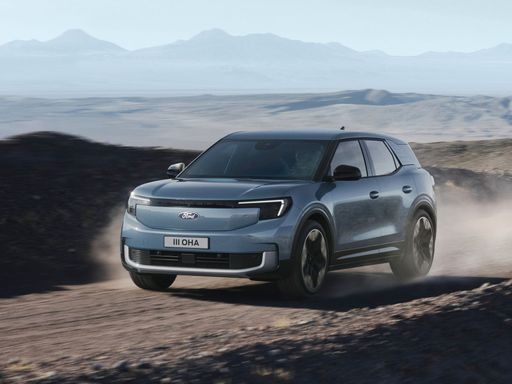 @ Ford Motor Company / Ford Media Center
@ Ford Motor Company / Ford Media Center
Ford Explorer EV
Costs and Consumption
View detailed analysis
Engine and Performance
View detailed analysis
Dimensions and Body
View detailed analysis
Ford Explorer EV
The Ford Explorer EV translates the familiar big‑American SUV presence into whisper‑quiet electric motoring, offering roomy seating and a tech‑forward cabin that will please families and road‑trippers alike. It drives with more composure than its boxy looks suggest, blending a comfortable ride and eager acceleration while undercutting the guilt of gas stops — a practical, modern alternative for buyers who want Explorer space with electric charm.
details @ Ford Motor Company / Ford Media Center
@ Ford Motor Company / Ford Media Center
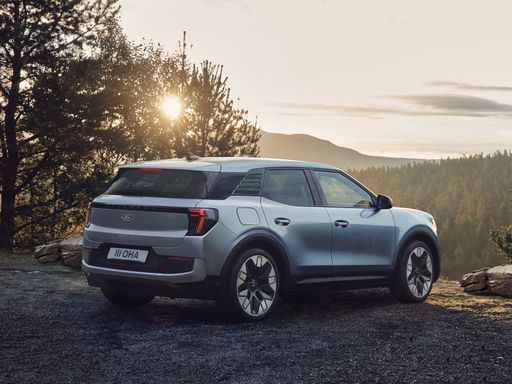 @ Ford Motor Company / Ford Media Center
@ Ford Motor Company / Ford Media Center
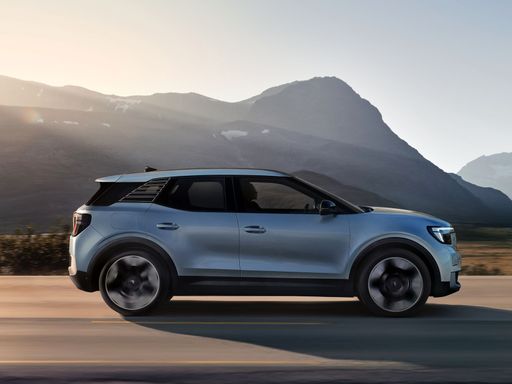 @ Ford Motor Company / Ford Media Center
@ Ford Motor Company / Ford Media Center
Toyota Land Cruiser
The Toyota Land Cruiser is the kind of SUV that makes you feel ready to abandon the map and take the long way home, with legendary go-anywhere capability wrapped in reassuringly solid build quality. Inside it's surprisingly comfortable and grown-up — a practical luxury for buyers who want reliability and presence rather than fleeting flash.
details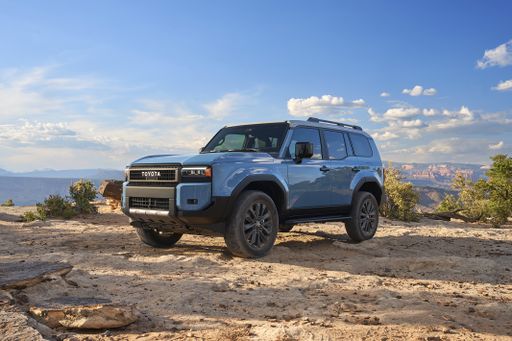 @ Toyota Motor Corporation
@ Toyota Motor Corporation
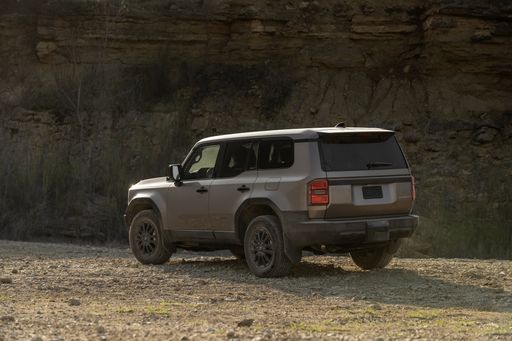 @ Toyota Motor Corporation
@ Toyota Motor Corporation
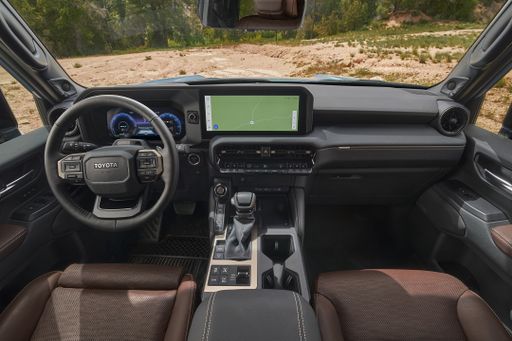 @ Toyota Motor Corporation
@ Toyota Motor Corporation
 @ Ford Motor Company / Ford Media Center
@ Ford Motor Company / Ford Media Center
|
 @ Toyota Motor Corporation
@ Toyota Motor Corporation
|
|
|
|
Costs and Consumption |
|
|---|---|
|
Price
34200 - 48800 £
|
Price
70700 - 79300 £
|
|
Consumption L/100km
-
|
Consumption L/100km
10.6 - 10.8 L
|
|
Consumption kWh/100km
14.5 - 17.2 kWh
|
Consumption kWh/100km
-
|
|
Electric Range
360 - 602 km
|
Electric Range
-
|
|
Battery Capacity
52 - 79 kWh
|
Battery Capacity
-
|
|
co2
0 g/km
|
co2
278 - 284 g/km
|
|
Fuel tank capacity
-
|
Fuel tank capacity
80 L
|
Dimensions and Body |
|
|---|---|
|
Body Type
SUV
|
Body Type
Off-Roader
|
|
Seats
5
|
Seats
5 - 7
|
|
Doors
5
|
Doors
5
|
|
Curb weight
1908 - 2179 kg
|
Curb weight
2610 kg
|
|
Trunk capacity
445 - 450 L
|
Trunk capacity
143 - 742 L
|
|
Length
4468 mm
|
Length
4925 mm
|
|
Width
1871 mm
|
Width
1980 mm
|
|
Height
1630 - 1639 mm
|
Height
1935 mm
|
|
Max trunk capacity
1417 - 1422 L
|
Max trunk capacity
1829 - 1895 L
|
|
Payload
561 - 585 kg
|
Payload
540 kg
|
Engine and Performance |
|
|---|---|
|
Engine Type
Electric
|
Engine Type
Diesel
|
|
Transmission
Automatic
|
Transmission
Automatic
|
|
Transmission Detail
Reduction Gearbox
|
Transmission Detail
Automatic Gearbox
|
|
Drive Type
Rear-Wheel Drive, All-Wheel Drive
|
Drive Type
All-Wheel Drive
|
|
Power HP
170 - 340 HP
|
Power HP
205 HP
|
|
Acceleration 0-100km/h
5.3 - 8.7 s
|
Acceleration 0-100km/h
12.30 s
|
|
Max Speed
160 - 180 km/h
|
Max Speed
170 km/h
|
|
Torque
310 - 679 Nm
|
Torque
500 Nm
|
|
Number of Cylinders
-
|
Number of Cylinders
4
|
|
Power kW
125 - 250 kW
|
Power kW
151 kW
|
|
Engine capacity
-
|
Engine capacity
2755 cm3
|
General |
|
|---|---|
|
Model Year
2024 - 2025
|
Model Year
2025
|
|
CO2 Efficiency Class
A
|
CO2 Efficiency Class
G
|
|
Brand
Ford
|
Brand
Toyota
|
What drive types are available for the Ford Explorer EV?
The Ford Explorer EV is available as Rear-Wheel Drive or All-Wheel Drive.
The prices and data displayed are estimates based on German list prices and may vary by country. This information is not legally binding.
